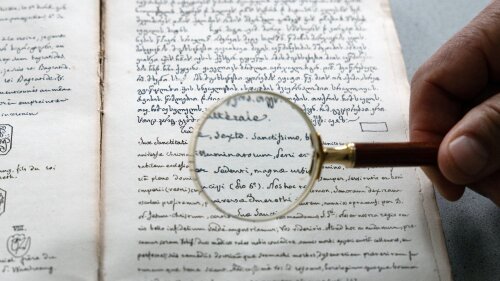
-
Merker, Jenny Lehrstuhl Geschichte der Frühen Neuzeit
Room 225/225A
Bachstraße 18k
07743 Jena
-
Kontakt
E-mail: jenny.merker[at]uni-jena.de
-
Kurzbiografie
Since January 2025, Jenny Merker has been pursuing a doctorate at Friedrich Schiller University in Jena in the field of early modern history (main supervisor: Prof. Dr. Kim Siebenhüner de) and the history of natural science (co-supervisor: Prof. Dr. Christina Brandt). She is receiving a doctoral scholarship as part of the Imaginamics Cluster of Excellence initiative, funded by the Thuringian Ministry of Science, Education and Culture (TMBWK). She had previously been awarded a state graduate scholarship, which she declined in favour of the Imaginamics scholarship. Jenny Merker passed her first state examination in biology in 2024 and her first state examination in history and German studies at the FSU Jena in 2023. In her state examination thesis entitled ‘Experiencing and learning about the plague: Plague imaginations in the early modern period’, she examined the perception and cultural interpretation of epidemics in the early modern context.
-
Forschungsinteressen
- History of zoology / animal studies
- Natural history in the early modern period
- Colonial knowledge systems and imaginative practices
- Collecting, classifying and representing non-European animals
- Human-animal studies
- Visual cultures of scientific representation
-
Projekte
Colonial Zoology in the Early Modern Period: Animals between Science, Power and Imagination (Doctoral Thesis)
This doctoral project aims to establish the hitherto unexamined concept of ‘colonial zoology’ and, in particular, to analyse the significance of imagination in the practices of collecting, classifying and representing animals from non-European regions of the world in the early modern period – a time when zoology developed as an independent scientific discipline. Using case studies, such as the three-toed sloth, the project examines how imaginative practices not only shaped the production of natural history knowledge, but also contributed to the legitimisation and perpetuation of colonial power structures. The examination of early natural history descriptions, museum objects from natural history collections, and visual representations shows how colonial imaginations had a lasting impact on the perception and systematisation of non-European fauna.
